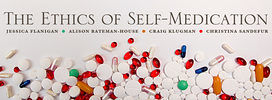Lead Essay
Physicians are ethically bound respect patients’ medical choices whenever patients wish to refuse care. Yet both they and government regulatory agencies are altogether willing to prohibit patients from taking medical interventions into their own hands. In particular, many drugs are unavailable without prescriptions, and this impinges meaningfully on patients’ rights to self-medicate. Jessica Flanigan argues that we should take these rights more seriously. The results, she argues, will include greater respect and trust in medical settings, better health outcomes, and improved overall wellbeing for patients.
Response Essays
Patients’ autonomy is a key principle of bioethics, says Alison Bateman-House, and with good reason. Yet others must also be protected, including justice and benificence. These principles mean that many of the regulatory safeguards of modern American medicine are indeed justified. Bioethics must never disregard autonomy, but it is far from the only consideration at hand.
Craig Klugman argues that in the field of medicine we need a measure of paternalism to keep from hurting ourselves and others. Doctors and pharmacists train intensively for years to develop an extensive knowledge of which therapies are best for which cases, and to know when they can and cannot be used together. Patients lack this knowledge. They also commonly lack the time to acquire any of it during an illness. As a result they often risk hurting themselves and others when they self-medicate.
Christina Sandefur argues that our system of drug regulation is fundamentally unjust: While some dangerous drugs are authorized government, whether with a prescription or without, some other drugs are not available by any legal means, even when patients are informed and willing to bear the risks. Regulation even goes so far as to prohibit certain parties from discussing off-label use of prescription drugs. These are not merely theoretical impositions, either, because individuals stand to live or die in consequence.
The Conversation
Coming Up
Essays by Craig Klugman, Alison Bateman-House, and Christina Sandefur. Discussion through the end of the month.

